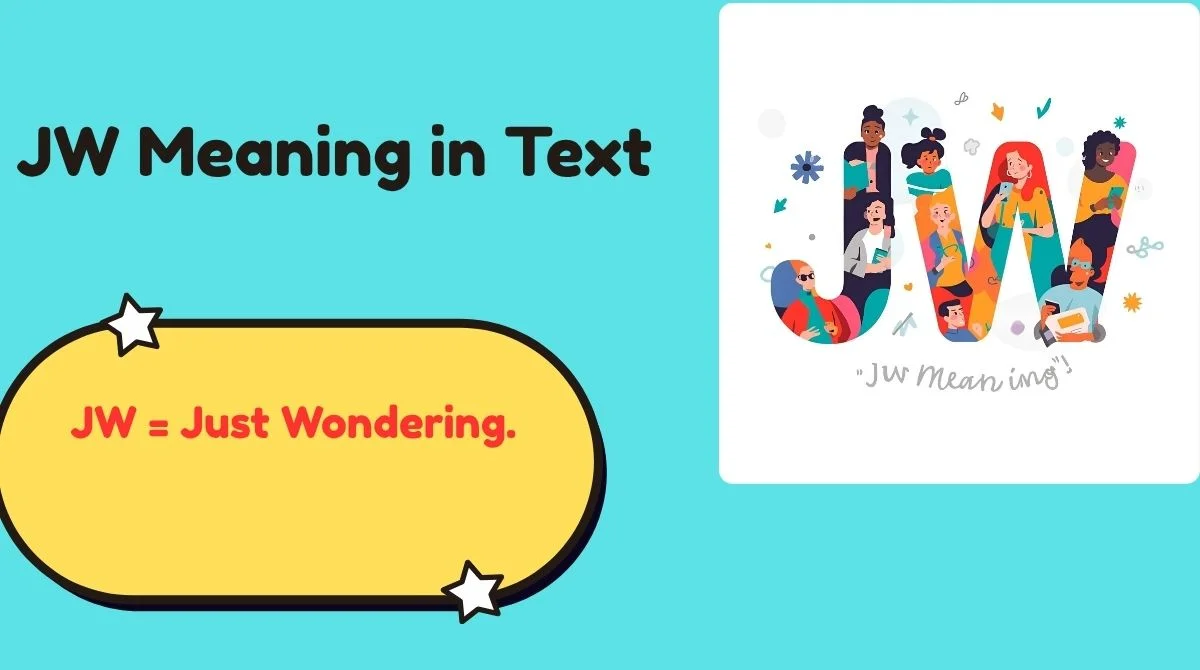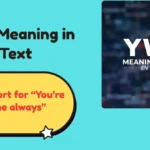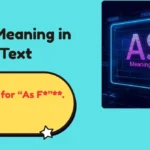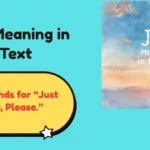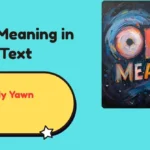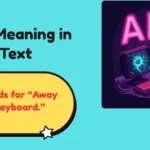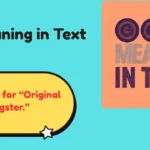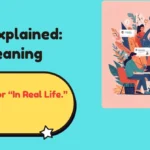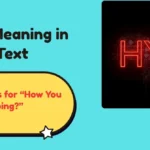Digital conversations move fast. Two letters can change everything. One of those powerful little combos is JW — short for “Just Wondering.”
Used the right way, JW softens questions, creates friendly tone, and keeps messages light. Used the wrong way, it can sound distant, passive-aggressive, or even confusing.
This article breaks down the real JW meaning in text, where and how to use it, what to avoid, and better alternatives that sharpen your communication.
Why “JW” Matters in Modern Digital Communication
Language evolves quickly, especially online. Texting has its own rhythm — short phrases, abbreviations, and quick replies. In that rhythm, “JW” has carved out a special role.
Here’s why it matters:
- Tone sets perception. A simple “JW” can make your question sound light or hesitant, depending on context.
- Misunderstandings spread fast. If the other person doesn’t know what “JW” means, your message can fall flat.
- Politeness and subtlety count. JW is often used to show curiosity without pressure.
“In a world where texts carry more weight than we think, two letters can feel like a whisper or a shout.”
When people misread your tone, it can lead to awkwardness or lost opportunities. Understanding how “JW” works helps prevent that.
What “JW” Actually Means in Texting
JW = Just Wondering.
That’s the core. But this abbreviation does more than state curiosity. It softens your words, making them less direct and less likely to sound demanding.
Examples of how JW works:
- “JW if you’re free later” → soft and curious
- “Just wondering if you saw my email” → polite nudge
- “JW.” (alone) → can sound vague or passive depending on relationship
JW entered texting culture through early instant messaging platforms and spread fast. It fits into casual, quick communication. But how it’s received depends on tone, punctuation, and context.
The Real Intent Behind “JW”
JW isn’t just about asking. It’s about how you ask.
Tone and intention often hide behind short texts. JW usually signals:
- Politeness: The sender doesn’t want to sound pushy.
- Hesitation: They’re not sure if the question is appropriate.
- Soft curiosity: They want an answer but don’t want to pressure you.
How punctuation changes the feel:
| JW Variation | Tone Perceived | Example |
|---|---|---|
| jw | Casual, light | “jw if ur coming” |
| JW | Neutral | “JW if you’re done yet” |
| JW? | Curious, polite | “JW? Did it ship yet?” |
| JW. | Distant or hesitant | “JW.” after a pause can sound uncertain |
Even a period can shift meaning. That’s why context matters just as much as the letters themselves.
Common Scenarios Where “JW” Is Used
“JW” thrives in fast-paced chats. But its tone can change depending on where and how it’s used.
Casual Chats Between Friends
When talking with friends, JW often carries a friendly, easygoing tone.
- “JW if you’re still down for tonight.”
- “jw what you’re doing rn.”
Why it works: No pressure. Just curiosity.
Professional Conversations
Coworkers use JW to keep things polite and non-demanding.
- “JW if the report’s been reviewed.”
- “JW if you’ve had a chance to check.”
Caution: Overusing abbreviations at work can seem unprofessional. Know your audience.
Customer Service or Business
Customers or clients might use JW to soften their questions.
- “JW when the package will arrive.”
- “JW if you’re open on weekends.”
Risk: Some businesses may not recognize the abbreviation. Full phrasing works better here.
Dating and Relationships
JW can signal curiosity without sounding needy.
- “JW if you’re still awake 😊”
- “jw what you’re doing later.”
Tone here matters most — a lowercase “jw” can feel casual and sweet, but a “JW.” after a delay can sound cold.
Group Chats or Team Updates
In team chats, JW often opens a soft inquiry.
- “JW if everyone’s on board with the plan.”
- “JW if we have a final time.”
It helps keep the message neutral, which is useful when talking to multiple people at once.
When Not to Use “JW”
“JW” can misfire in the wrong setting.
Here’s when to avoid it:
- Formal or unfamiliar communication: The receiver might not know what it means.
- High-stakes conversations: Abbreviations can seem careless.
- Sensitive topics: “JW” may downplay serious issues unintentionally.
- When clarity matters more than casual tone: It can sound vague or dismissive.
Example of poor usage:
- ❌ “JW if we’re still meeting with the board.” (sounds uncertain, vague)
- ✅ “Just wanted to confirm our meeting time with the board.”
15 Clear Alternatives to “JW” — With Usage and Tone Explained
When “JW” feels too vague or risky, these phrases make your message clear and polite.
| Alternative Phrase | Best Used When | Tone | Example |
|---|---|---|---|
| I was just curious… | Casual chats | Friendly | “I was just curious if you saw my message.” |
| I was wondering… | Casual or semi-formal | Soft, polite | “I was wondering if you’ve got a minute.” |
| Would you happen to know… | Formal/professional | Courteous | “Would you happen to know if the report’s ready?” |
| If you don’t mind me asking… | Sensitive topics | Respectful | “If you don’t mind me asking, how did it go?” |
| Just wanted to ask… | Neutral | Polite | “Just wanted to ask if we’re still on for tomorrow.” |
| Out of curiosity… | Informal | Light | “Out of curiosity, how did you find that place?” |
| Mind if I ask… | Informal to semi-formal | Soft | “Mind if I ask what happened?” |
| Could you let me know… | Professional | Direct, polite | “Could you let me know when it’s ready?” |
| Do you know if… | General | Neutral | “Do you know if they’ve confirmed yet?” |
| Is there any update on… | Professional | Polite | “Is there any update on the project?” |
| Would it be alright if I asked… | Sensitive | Gentle | “Would it be alright if I asked why?” |
| Just checking in to see… | Follow-ups | Neutral | “Just checking in to see if you had a chance to look.” |
| I hope it’s okay to ask… | Careful | Respectful | “I hope it’s okay to ask about your decision.” |
| I’m interested to know… | Inquisitive | Curious | “I’m interested to know what you think.” |
| Could I ask something, if that’s alright? | Soft entry | Polite | “Could I ask something, if that’s alright?” |
Why these work:
- They make your tone clear.
- They match different levels of formality.
- They reduce the risk of sounding passive-aggressive.
How to Choose the Right Alternative
Choosing the right phrase depends on the situation. Three simple rules make it easy.
Match the Tone to the Relationship
- Friends = light and casual
- Coworkers = polite and neutral
- Clients or superiors = professional and respectful
“The way you ask shapes the way people respond.”
Adjust for Formality
- Use full phrases at work or with strangers.
- Use abbreviations only when both sides understand them.
- Reserve “JW” for casual or friendly conversations.
Be Clear With Intent
People respond better when they understand your intent. Don’t hide behind vague abbreviations if you actually need an answer.
-
Instead of “JW if you’re done”
→ Say “Just checking in to see if it’s ready.”
Clarity builds trust and keeps conversations smooth.
Practical Communication Tips When Using Abbreviations
Abbreviations are tools, not shortcuts for everything. Use them wisely.
- ✅ Know your audience. Not everyone understands “JW.”
- ✅ Keep context in mind. Some phrases work better face-to-face than in text.
- ✅ Don’t stack abbreviations. “JW btw if u can ASAP” is confusing.
- ✅ Re-read before sending. Check tone, punctuation, and clarity.
A thoughtful message doesn’t need to be long. It just needs to be clear.
Real-Life Examples: JW vs. Better Alternatives
Here’s how phrasing changes tone and clarity.
Friendly Chat with a Friend
- ❌ “jw if ur still down”
- ✅ “Hey, just curious if you’re still in for tonight 😊”
Result: Feels warmer, more personal.
Texting a Manager
- ❌ “JW if you sent it”
- ✅ “Just checking in to see if the file went out.”
Result: Professional and polite, avoids sounding careless.
Customer Asking a Business
- ❌ “JW when it’ll arrive”
- ✅ “Could you let me know when the delivery is expected?”
Result: Clear and respectful.
Dating or Personal Connection
- ❌ “JW.” (after a long pause)
- ✅ “Hey, just wondering what you’re up to later.”
Result: Softer, more approachable.
Common Misunderstandings and How to Avoid Them
“JW” can easily be misunderstood. Here’s how to dodge common pitfalls:
- Tone gaps: What you mean vs. what they read isn’t always the same.
- Lowercase vs. uppercase: Lowercase feels casual, uppercase neutral, period can sound cold.
- Cultural differences: Not everyone uses or understands abbreviations.
- Delayed replies: “JW.” after a gap can sound passive-aggressive.
Fixing misunderstandings:
- Add a quick follow-up: “Sorry if that came off weird—just curious!”
- Use full phrases when unsure.
- Avoid one-word or one-abbreviation messages in sensitive contexts.
FAQ: JW Meaning in Text
What does JW mean in texting?
JW stands for “Just Wondering.” It’s used to express curiosity or soften a question.
Is JW rude or polite?
JW itself isn’t rude. But tone, punctuation, and timing can make it sound passive or polite.
Can I use JW in professional emails?
It’s better to avoid abbreviations like JW in formal settings. Use full phrases like “I was wondering” or “Just checking in.”
How do I reply if someone uses JW?
Reply based on the context. If they’re asking a question, respond clearly. If it’s vague, ask for clarification.
What are some common texting abbreviations like JW?
Common ones include “BRB” (Be Right Back), “FYI” (For Your Information), “BTW” (By The Way), and “TTYL” (Talk To You Later).
Final Thoughts
Two letters can say a lot. But they can also create gaps if not used carefully. JW softens questions, but it’s not a one-size-fits-all tool. The more intentional your words, the better your messages land.
- Be mindful of tone.
- Match your message to the relationship.
- Clarity beats cleverness.
“Words are free, but how you use them can cost or build connection.”
Strong communication isn’t about being fancy. It’s about being understood.
